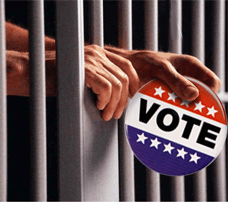This month the Maryland Senate passed a new bill to allow ex-felons voting rights as soon as they are released from prison. Ex-felons would be able to vote before they have completed parole, probation or paid restitution for their crimes.
Advocates for the change in law believe that offering earlier civic engagement to ex-felons will bring them closer to their communities as they reintegrate into society. They also believe the law would eliminate confusion about when ex-felons can vote by simplifying the process.
The bill still needs to be approved by the Maryland House of Delegates and Governor Larry Hogan (R), which may be a longshot as every Republican in the Senate voted against the bill. But support for the measure is definitely brewing in the Maryland House. The House bill’s lead sponsor is freshman delegate Cory V. McCray, a former teenage drug dealer from East Baltimore. McCray, who often recounts his numerous arrests and life as a young dealer, believes Maryland must engage ex-felons so they do not get left behind.
If Maryland passes this new law, an estimated 40,000 ex-felons would be eligible to vote. The majority of these voters are racial or ethnic minorities. A dozen states already have similar laws, allowing anyone not in prison to be eligible to vote. Two states - Vermont and Maine - allow inmates to vote from prison.
